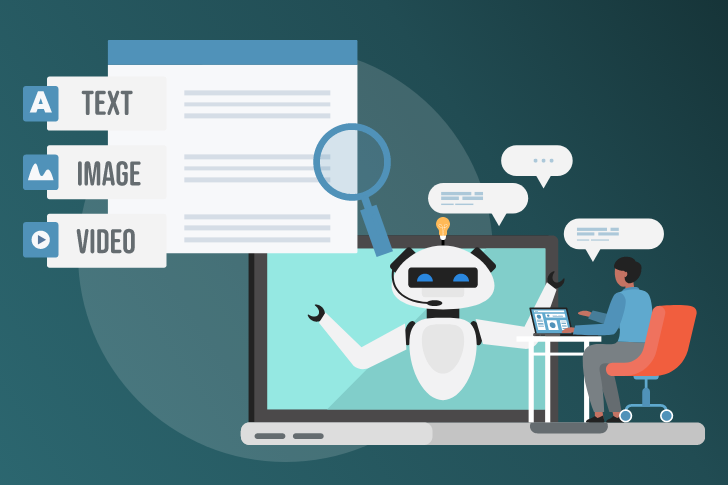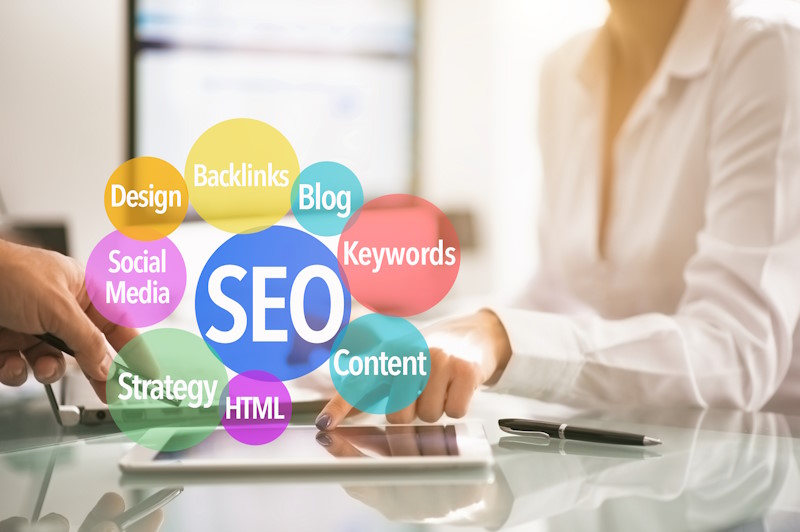Dominating Google Rankings With AI: Expert Medical SEO Strategies for Private Practices

Who hasn’t heard of OpenAI and ChatGPT? The ongoing international dialogue about artificial intelligence has become a fever pitch for months. The number of commentators has increased, and people now consider AI more than science fiction.
In addition, there’s talk of artificial intelligence replacing human workers. Still, on the other side of the debate, some believe that artificial intelligence will only complement humans and not replace them.
Whatever the case may be in ten or twenty years after the birth of ChatGPT (the AI chatbot), we can’t deny that machine learning and artificial intelligence can significantly help digital marketing for the medical industry. Digital healthcare marketing is complex and tedious, and utilizing the right technology often solves many difficulties in making SEO campaigns efficient.
Can AI Replace Human Content Writing in Search Engine Optimization?
The short answer is no, it can’t. But hear us out: AI has its uses, but writing blogs and pages in their entirety for SEO is not one of them. Content is the heart of inbound marketing efforts, and while generative AI can create thousands of words with the press of a button, people must realize a couple of things:
1. AI takes information from the internet and uses basic information to generate human-readable text.
2. Humans train artificial intelligence, still. They don’t learn on their own without absolutely no input from people.
3. Inaccurate information, partially correct information, and other types of otherwise flawed information can make it to the final text of a website if a website owner chooses to use only generative AI to create the copy.
4. AI can even pick up prejudices from existing information on the internet.
While using artificial intelligence is tempting because the AI chatbot services of today are so cheap, no independent medical practitioner should be willing to risk the integrity of their website to save a few bucks. Additionally, content writing for search engine optimization is part of a larger inbound marketing strategy that uses other moving parts that artificial intelligence cannot access. For example, AI writing tools have no access to or do not understand the following:
1. A medical practitioner’s academic and professional history, ethics, values, professional goals, experience, etc.
2. The history of independent medical practice and changes and improvements over the years.
3. The nuances of medical practice and the complexity of patient-doctor dynamics
4. The specificities of the medical practice’s branding and any changes that occur as the medical practice overcomes challenges yearly.
5. The nuances of medical information as it relates to medical services and patients.
6. The appropriate language to be used when addressing patients and their families online.
7. Complex adjustments are needed to facilitate communication and connection between patients and doctors.
8. The balancing act between necessary steps in healthcare marketing in content and how the model of medical care can fit into this framework.
Many more factors affect the effectiveness of artificial intelligence as a generative tool for digital healthcare marketing. Still, one thing is for sure: an independent medical practitioner would be stepping in the wrong direction if they choose to use generative AI and not the services of a professional content provider for their content needs. Furthermore, while AI can get brighter in the years to come, we are nowhere near where AI replaces human intelligence completely.
The Year of AI is Also the Year of Maximizing Your Healthcare Marketing ROI
Need a Boost that Will Launch Your New Website’s Presence?
Don’t Delay – Our SEO and PPC Specialists Can Help Take Your Digital Marketing to the Next Level
Here at Officite, we ensure that independent medical practitioners get the help they need to make their healthcare marketing campaigns work. With our cutting-edge technology and healthcare marketing solutions spanning doctor portals, medical website SEO, medical web design, Google Ads, Facebook Ads, and medical reputation management services, we’re here to make your marketing objectives come true and with measurable results. Our systems are updated weekly to meet contemporary technology standards in the same way that AI is constantly learning and improving to better meet your practice’s goals.
How Does AI Contribute to Easing the Work in Healthcare Marketing and SEO?
We don’t deny that SEO and healthcare marketing takes a lot of work, and the hours and stress are associated with getting things done. However, since a medical practice’s marketing budget is on the line, we’d like to emphasize that AI can help ease some burdens. Below are some fantastic ways artificial intelligence can help you achieve your inbound marketing/SEO efforts.
Refined Targeting in Healthcare Marketing
Healthcare marketing (including SEO) is typically an independent medical practice’s most significant expense and one that may be made more efficient with artificial intelligence.
Businesses used to spend exorbitant amounts of money on traditional media advertising like television, radio, and newspapers, with the full understanding that only a small fraction of those who saw their ads would really buy from them. This was highly inefficient, yet corporations needed to compete for market dominance.
With AI, we now know a lot more about who is and isn’t interested in what we offer, thanks to the internet and measurable user data. Take e-commerce giant Amazon, which offers robust recommendation technology, and search giant Google, which has an equally massive data landscape for targeted advertising. AI/ML has been integrated into these platforms, allowing them to improve over time as they are exposed to more information about clients and their purchasing behaviors.
A Radar for Micro-Influencers
AI algorithms are already being used to ensure that online personalities most likely to appeal to users appear most in their newsfeeds. Influencer marketing is another major trend in marketing right now.
Marketers will increasingly employ AI to find micro-influencers whose audiences and styles align with their own. As a result, “micro-influencers” have emerged; these are regular people, as opposed to A-list celebrities, who have gained a dedicated following by catering to a specific subset of their target audience with authoritative insights. With the help of AI, medical practices can search across a wide variety of subsets of their target audience to identify the most relevant micro-influencers.
Customer Relationship Management
Understanding how to manage relationships with current patients is crucial for any medical practice, as these patients account for revenue. AI can prevent patient “churn” by spotting patterns of behavior that usually indicate a patient is about to leave for another healthcare provider.
Automatically directing promotions and incentives to these patients is one strategy for winning back their loyalty. As a result, chatbot technology, driven by natural language processing, is becoming increasingly popular among AI-enhanced marketers.
This can help sort incoming consumer inquiries so that those who need an immediate answer get it, reducing the likelihood of disappointment. In addition, with the help of AI-powered CRM, organizations can make more precise projections across all the markets in which they participate. It can also be used for data quality management in the CRM by spotting duplicate or inaccurate patient records.
AI Enhances Content Marketing and SEO
AI-enhanced content marketing and SEO has become the standard in many sectors thanks to the popularity of social media marketing and the ever-increasing need for online material.
Here, AI comes in handy by pointing us toward the most effective channels for disseminating the material we create to our audience. There are now a variety of AI-enabled solutions that can perform this task automatically.
Some AI content tools can help medical practitioners improve their social media shares and email opening rates by providing headline-generating tools and allowing users to track their progress and adjust their written output accordingly.
You can also use AI in other parts of the content creation process, including visual generation. So yes, some AI tools can help generate unique and engaging visuals for blog posts and pages.
Content personalization is also more accessible with the help of AI, and human-written content can be enhanced with keywords derived from the data harvest of AI services.
Artificial intelligence can help writers and editors integrate vital reference points into overarching marketing messages. One example of this integration process is when an editor or content planner uses AI to generate headlines and outlines for SEO content. The data from popular content across the web can help shorten the content brainstorming process. As we don’t have to reinvent the wheel, we can use the existing top-ranking references to create relevant content for any medical website.
The customers’ whereabouts in the buying cycle can be more accurately determined with the help of AI. You can target them with information that sets your product apart from the competition if it learns that they are “shopping around.” If it determines that a customer is actively shopping, it can send them promotions urging them to “act now” to take advantage of a special offer before it expires.
Key Takeaways
Incorporating AI/ML into eCommerce and search platforms means these tools can learn from users’ preferences over time. This can facilitate monetary savings and a rise in revenue. In addition, marketers are using AI algorithms to find micro-influencers whose followers and approaches are compatible with their own. AI pulls data from the web and converts it into human-readable prose, but it can’t replace human writers yet.
Officite provides healthcare marketing solutions for solo doctors to increase their revenue.
AI can lighten a load of healthcare marketing by assisting independent medical practices in honing their targeting and enhancing their inbound marketing/SEO initiatives.
Artificially intelligent writing tools cannot access a doctor’s or healthcare provider’s academic and professional background, ethics, values, professional goals, experience, branding, nuances of medical practice, medical information, appropriate language, adjustments needed to facilitate communication and connection between patients and doctors, or balancing act between necessary steps in healthcare marketing.
Frequently Asked Questions
How do AI language models help humans craft better content for websites?
Artificial intelligence also now powers chatbots that provide instant customer support and assistance. These chatbots can understand and respond to queries in natural language, improving user experience and reducing response times.
How does AI help medical search engine optimization?
They can also identify gaps in content and suggest topics for future posts.
AI tools can analyze a website’s link profile and suggest new link-building opportunities. They can also identify low-quality or spammy links and suggest ways to remove them. These tools can quickly analyze vast amounts of data to provide insights into campaign performance and user behavior.
AI-powered SEO platforms can also generate automated reports highlighting key metrics, trends, and opportunities. Current algorithms can analyze user behavior and preferences to personalize content and experiences for individual users. This can improve engagement, retention, and conversion rates.
How can AI help with local SEO campaigns?
AI/ML can also help optimize local listings on directories such as Google My Business, Yelp, and Facebook by suggesting accurate business information, photos, and reviews. Some apps can monitor online reviews and social media mentions to identify negative feedback and provide insights on improving customer sentiment. And finally, AI-powered tools can analyze website content and suggest changes to enhance its relevance and readability for users in specific locations.



